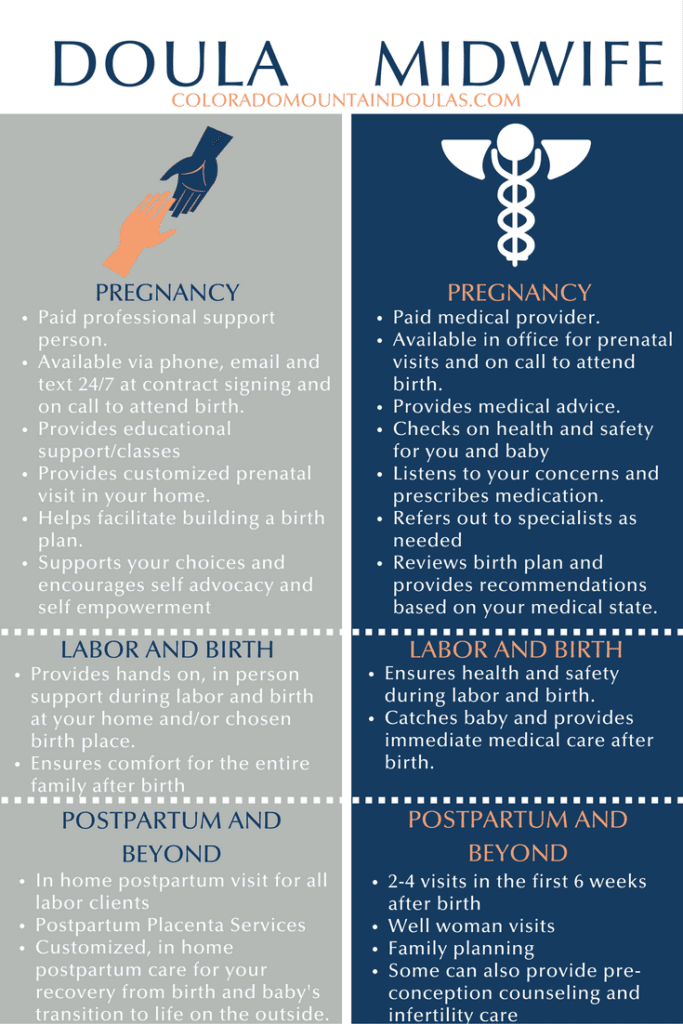 This is a question that doulas AND midwives get a lot, so let’s jump right in.
This is a question that doulas AND midwives get a lot, so let’s jump right in.
First, our jobs are 100% different.
“Especially for first-time moms, the companionship of a good doula, in the longest part of labor…….before active labor begins, helps the parents relax, leaving the midwife the energy and stamina to be fully present during the active phase of labor, in which her skills and knowledge are needed to assess the health and welfare of mom and baby.”
~Dotti Kirkpatrick, CPM, Birth Matters Midwifery
While midwives are amazing providers who get to know their patients well and are wonderful at putting minds at ease, their primary job is the health and safety of the baby and the person giving birth to the baby. They see many clients every month. They run tests, interpret tests, prescribe medication, chart results, catch babies, and know exactly when to refer you out to an OB if your pregnancy becomes out of the scope of their medical practice.
“I think clients should have doulas for a few reasons. One being that research has shown that the most effective tool a woman can have to achieve an unmedicated birth is someone who is professionally hired and not emotionally tied to her prior to the birth. This is exactly what a doula is.”
~Megan Dickey, CNM, Colorado Nurse Midwives
Doulas, on the other hand, are in NO WAY medical providers and should never be giving medical advice, listening to or interpreting heart tones, taking blood pressure, doing any type of exam, or advising you in any way on anything “strange or concerning”. A doula’s primary role is physical, educational, and emotional support for the entire family. We are available to answer your questions, ease your mind, be a shoulder to cry on, and point you in the right direction to find the unbiased information you seek so that you can make your own decisions. We help you know when to call your midwife or doctor and are available to support you through the decisions you make after discussing your options with your provider.

“A doula is invaluable to the team in birth, especially in home birth. No one goes into a marathon not having trained. Usually they have help. Just like you wouldn’t go into a marathon without a team in place, you wouldn’t go into a home birth without a doula as part of your team. You go into it knowing you’re going to run this and knowing you’re going to finish. Your doula can be like your trainer and cheerleader, cheering you and your partner on in any way that’s needed, helping you physically get over hurdles in the most efficient way possible. Your midwife can be there to help with some of the physical hurdles, but as the midwife at a home birth, I have to have the whole picture in place, to make sure that everyone stays healthy and make sure things don’t veer off course. The doula being there helps me to be able to focus on that. In a lot of ways, the doula is even more of a help to the partner than they are to the woman in labor, sometimes. When the labor becomes difficult for the mother, the doula can be there to help reassure the partner that this is normal and that she will be able to continue to do it. Having a doula present at a birth seems to make it easier on both the birthing mother and her partner. For this reason, I highly recommend having a doula present for most births.”
~Jolene Hamann, CNM, Springs Midwifery & Women’s Care
While our roles can often intersect, in the way that we care and support families during pregnancy and birth, when it comes to physical and emotional support, the doula’s role is completely focused, while the midwife and their assistants much put the medical side first.
“What’s the difference between a midwife and a doula? I have a hard time answering this question. Even though I have served in both of these roles, I have a hard time putting the differences into words. In essence, a doula is a trained servant that comes alongside the expecting couple, guiding them through the process. They offer information about pregnancy, birth, postpartum and newborn care. They give the couple evidence-based research to help them choose the kind of birth they want, and they stick by the birthing woman’s side during labor and birth to support her achieving her best birth.
A midwife is an alternative care provider, caring for women from the positive pregnancy test through the postpartum period. We are the guardians of normal, physiological birth. We provide prenatal care, offer testing, and engage with women and their families to support a natural pregnancy and birth process from start to finish, including catching the baby as mom delivers.”
~Jennifer Green, CPM, Organic Homebirth LLC
This graphic shows at a glance some of the primary differences between midwives and doulas and how they work to compliment one another. It does not encompass all midwives or all doulas, and as a consumer, you should always interview the people you plan to have on your birth team.
Doulas and midwives work together, as part of a team, to make your pregnancy, birth, and postpartum period one of confidence, joy, and relaxation. As professional doulas in Colorado, we have had the privilege of developing relationships with many wonderful and skilled Colorado midwives, and are always happy to share information about birth options in Denver, Colorado Springs, and other surrounding areas. Have more questions about midwives and doulas in Colorado? Give us a call. We’re happy to help you out. 719-581-9041

